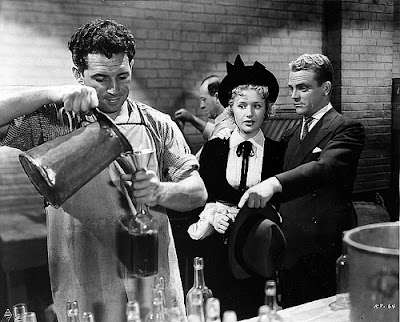 The Roaring Twenties (Raoul Walsh, 1939)
The Roaring Twenties (Raoul Walsh, 1939) Forward: "It may come to pass that, at some distant date, we will be confronted with another period similar to the one depicted in this photoplay. If that happens, I pray that the events, as dramatized here, will be remembered. In this film the characters are composites of people I knew, and the situations are those that actually occurred. Bitter or sweet, most memories become precious as the years move on. This film is a memory—and I am grateful for it." Mark Hellinger.
Every decade is full of event, often to the point where the world of the 0's is very far afield of the one in the 9's (of course, if you're "of an age" you can always find an exception to the rule—Hell-o, '80's). The 1920's started with troops coming home from World War I to become "the lost generation" while the country was experimenting with Prohibition. Rather than the temperance leagues creating a heaven on Earth by exorcising the demo rum, everything went to Hell with the rise of illegal liquor manufacturers, the rise of organized crime to gain some monetary control over the free-for-all, "the jazz age," flappers, wild dancing and, as with any "bender," a collapse...of the Stock Market in 1929. The Nation went from speak-easy's to soup kitchen's. Prohibition wasn't nearly as sobering as the Wall Street Crash.
It's the time of World War I, and trench soldiers Eddie Bartlett (James Cagney), George Hally (Humphrey Bogart), and Lloyd Hart (Jeffrey Lynn) are spending the last few hours of the War To End All Wars, just trying to survive it. They have no idea that their last acts in the conflict will be their final as soldiers and they're already thinking to what they'll be doing in peacetime. Hart had just graduated from Harvard law school and that's what he'll be doing; Eddie just wants to get back to being a mechanic; Hally ran a saloon. Hart takes aim at a German soldier and hesitates—"He looks like a kid, about 15 years old." Hally fires. "He won't be sixteen."
Another soldier dives in to the "hold." The war is over. Peace-time begins.
Not that peace-time will be easy. Lloyd does become a lawyer, Hally comes back to the States when the country is in the fever to make the country dry through Prohibition—not a good job prospect for a saloon-keeper—so he becomes a bootlegger and Eddie can't get his job back as a mechanic, so he starts driving a hack to get by.
His fortunes change a bit when a fare hires him to deliver a package to Panama Smith (Gladys George), who runs a speakeasy and that "package" turns out to be a shipment of booze. Eddie has the bad luck to deliver it right before the place is raided by the cops and he and Panama are escorted to jail. At trial, Panama gets acquitted, but Eddie takes the fall without revealing he was an innocent dupe. He does time, but once he's out, Panama repays the favor of not ratting her out by taking him on as a business partner in her own bootlegging enterprise. Taking a note from experience, Eddie starts buying up a fleet of cabs to used for "distribution" and the two start to prosper, Eddie becomes a bit of a high-roller.
Around this time, he runs into Jean Sherman (Priscilla Lane), a gal he knew from her writing to him in the war when she was in high school. She's all grown up now and he takes enough of an interest that he gets her a job as a chanteuse at the club Panama is propping up as the hostess.
Eddie does very well with taxi-delivery business, but he makes a mint as a boot-legger; he has sure-fire ways to solve the supply and demand issues of the industry—besides watering down their own product, he also takes advantage of the enterprise's illegality by tipping off the constabulary to the shipments of competitors, then raiding the warehouses where said constabulary keep it as evidence for disposal. This creates some tensions among the competing distributors—Eddie gains a lieutenant in Jeff, when he finds him on one of their raids, but Eddie's buddy Danny Green (Frank McHugh) is killed when he tries to broker a deal between the rivals.
That's Eddie's professional life. His personal life doesn't go so well. He's sweet on Jean, his singer-friend, but she'd rather be with Lloyd, now Eddie's lawyer, who's successful, good-looking and who doesn't stink like bathtub gin. Eddie barely stops himself from changing his reputation by way of smacking him in the face. He wants what's best for Jean, and if it's Lloyd, that's the way the drink is poured.
 |
| Wall Street literally melts, thanks to Warners FX wizards in The Roaring Twenties |
It's another of the Warner Studio's cautionary tales where the smart guy gets his comeuppance, and the street-wise becomes confronted with events far beyond his capacity to control, and is punished, all the while the film revels in the very exploits, good and ill, that he is ultimately judged for. Eddie will eventually die on the steps of a church, just shy of its doors and any possible redemption.
He won't make it to the '30's.










No comments:
Post a Comment